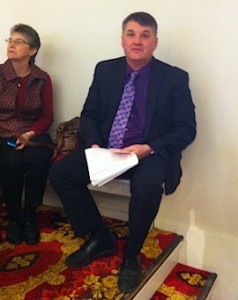MONTPELIER, Vt. — A bill on toxic chemical regulation that Gov. Phil Scott vetoed earlier this month met its final end in the House chamber on Wednesday as lawmakers voted to sustain the veto with 53 votes in support of the governor.
The bill, S.103, would have created a new Interagency Committee on Chemical Management to assess chemicals used in the industries for potential dangers to health, especially for children. It also would have given the state’s commissioner of health the power to ban or label products that may contain such chemicals, skipping over some of the protocol currently in place to ensure regulation fits according to thorough science and evidence.
The bill also would have required more testing of water wells and generally a new more aggressive apparatus for the state to go after suspect chemicals. Scott, however, has said the bill will create enormous complications for Vermont businesses.

House Minority Leader Don Turner, R-Milton
The Senate last week voted to overturn his veto, setting the stage for Wednesday’s showdown in the House, where 98 representatives would have been needed to override the governor.
Before the vote, House Minority Leader Rep. Don Turner, R-Milton, said he believed Republican lawmakers would be able to uphold Scott’s decision. It was a close call — 50 Republicans and three independents combined for 53 votes in favor of the governor, and 94 lawmakers voted to overturn the veto. Three were absent.
Turner spoke on the House floor before the roll call vote.
“I want Vermont children to be safe,” he said. “However, S.103 is not needed and will do nothing to improve children’s safety in Vermont. Current law allows the Vermont commissioner to issue a ban upon the recommendation of a committee that includes leaders of several state agencies.
“I understand that the regulatory process is working as designed and should proceed as originally envisioned.”
S.103 would have given the state’s health commissioner the power to ban children’s products containing certain chemicals after mere consultation with a committee, rather than requiring backing of multiple scientific studies. Turner said this “puts too much power in the hands of a single individual” and would ultimately take the decision process away from a “more scientific and legitimate” process.
Turner said the governor already created an interagency committee on chemical management by executive order, and the creation of a new committee would just be a redundancy.
Rep. David Deen, D-Westminster, criticized Scott’s veto, saying there was little difference between Scott’s veto letter and the language in the bill.
“There’s really only one difference of note between the governor’s objection and what was passed by the legislature in Sections 1 and 2,” he said. “That difference is who gets the report of the toxic’s working group, the governor or the legislature. That’s it. In my opinion, certainly, not the highest of values are at stake.”
Section 8 of the bill would have given the health commissioner more control over which children’s products should be listed with warnings about toxic chemicals.
The measure is largely a response to the perfluorooctanoic acid (PFOA) chemical exposure in Bennington that tainted hundreds of residential wells. In 2016, it was discovered that a factory once run by Teflon-products maker Chemfab leaked PFOA into homeowners’ properties, sparking a public outcry for greater regulation of chemicals from industry.
Rep. Kiah Morris, D-Bennington, spoke on this matter before the vote.
“You’ve heard the stories from members of the Bennington delegation for quite some time about why this bill was of such importance and why we need to push to ensure that it comes to a passage,” she said.
“The heartbreak that I witnessed when our community found out about PFOA in our waterways was so heavy, people that I knew who would smile couldn’t even look me in the eye as they told their story.”
Michael Bielawski is a reporter for True North Reports. Send him news tips at bielawski82@yahoo.com and follow him on Twitter @TrueNorthMikeB.



Phil Scott , is kind of like Vermont Weather ……….your never sure what your going to get !!
I wish he would have used a little common sense a few weeks ago when he hastily signed
those gun bills .
“Turns out Vermont already has sufficient laws on the books, so more laws were not required.”
The same could be said of S.55,did that stop Gov. RINO Scott from signing it,No. He didn’t give a second thought to violating his campaign promises,oath of office,both Vermont and the Federal Constitutions.
J,
For some reason my comment disappeared, but you saw it before that happened.
The pot law was signed in haste and the gun laws were signed in haste.
You win some, you lose some
The Dems and Progs pulled out all the stops.
We are doing it for the women and children, they said. And vote getting.
How could Governor Scott not see that? No brainer!
Turns out Vermont already has sufficient laws on the books, so more laws were not required.
The additional law would merely impose additional mandates, overt or covert.
Why not spend more brain power on reducing education costs, say by 10% for starters?
There isnt a single problem that will ever be solved by adding MORE government to the mix
Or adding more government subsidized RE to the mix.
Government meddling IS THE PROBLEM.
But with too many Dems and Progs, Vermont financial well being likely will no change for the better.